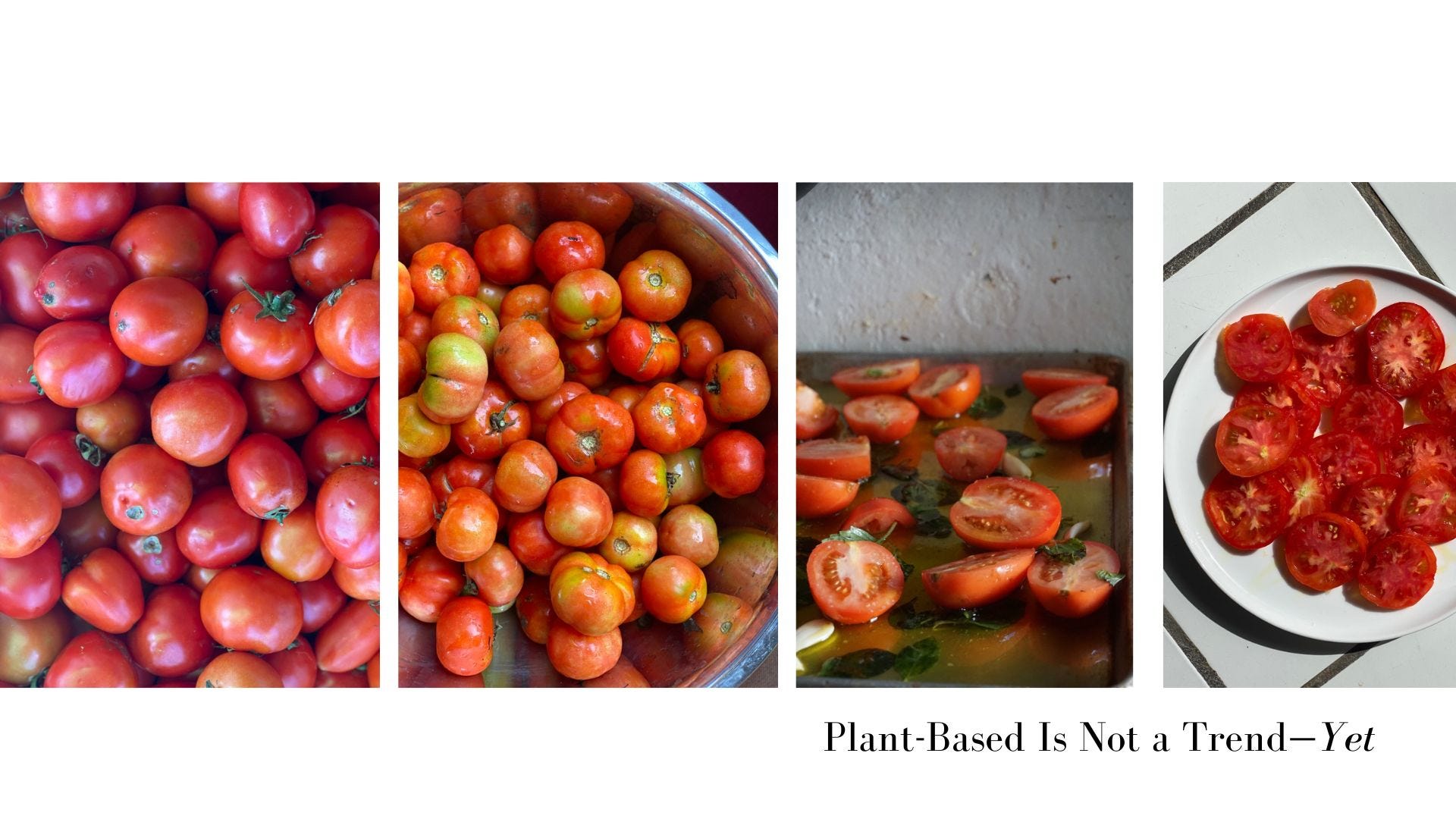
Don’t use AI. Don’t let it write for you. Don’t let it make art for you. Don’t let it think for you. Don’t degrade yourself like that.

Don’t use AI. Don’t let it write for you. Don’t let it make art for you. Don’t let it think for you. Don’t degrade yourself like that.

My parents flew to visit us in Seattle earlier this year. It's always lovely to see them and spend time together. We keep our visits low-key: neighborhood or park strolls, an IPA or fancy cocktail, and plenty of good food. We catch up on conversations that don't work over the phone and retell stories we all know by heart.
One night before dinner I told them about an essay I wanted to write—this one. My mom was in college when my sister and I were kids. She often shared with us bits and pieces of what she learned while earning a business degree. It's the words of Professor Tom Campbell, as told by my mom, that rang and resonated through the years. She reposted on her own blog a personal essay she wrote about him many years ago.
Professor Campbell shared with her class the concept of single- and multi-lifers. He was describing the career trajectories of the people he'd studied in his own life. Single-lifers spend most of their lives in one career. They might do some job-hopping here and there, but a single line of work covers most of their employment. They might rise up the ranks of a single company or take the same job at many companies. Multi-lifers, by contrast, have much more variety in their working life. Their career path might seem more like a wandering kid at a zoo than any kind of ladder. I tried to summarize what my parents and Jamie discussed about our respective careers. I also gave my sister, another multi-lifer, a call while I was writing this.
Describing a type of person can feel a little like describing traits of a zodiac sign, but bear with me. I've narrowed down my concept of a multi-lifer to include these three characteristics.
Disposition. Multi-lifers often get bored. They move through their career with no small measure of restlessness. One advantage of this is they accumulate a variety of skills that may be useful in their future work. They have some self-awareness to know what kind of tasks they like and are good at.
They also need to be comfortable with adapting on the run. My sister says, "things don't always go the way you plan," both within a project and within a career itself. A strong multi-lifer can get their bearings and choose a new path from what's available. Making decisions like these ask of us multi-lifers no small amount of courage!
Circumstance. Not every multi-lifer becomes one by choice. Luck and opportunity play their parts over the years. Mom says, “some birds fly because they fledge the nest, others because they’re pushed out.” The important thing is that we're flying.
My mom was a manager at a big tech company, then a realtor, a writer, and the director of a senior housing community. Dad worked as a model maker and artist for much of his career, owning his own company. He learned to weld, carve wood, sculpt models out of polyurethane foam, teach 3D printing, and more. My sister spent years in all kinds of hospitality industry roles and now does project ops at a tech firm. She studied UX design and developed an HR department for an international startup. I've worked at a science lab, food bank, did STI/HIV counseling and testing, and so many restaurant jobs. We didn't choose most of these lives so much as spotted them and took a chance.
How they manage risk. This isn't about whether a multi-lifer pursues risky choices. "I think of myself as risk-averse," my dad said. I believe that! That doesn't mean he and my mom haven't taken risks. We've all moved across the country more than once. We've found places we thought we'd stay, and then decided to keep moving.
When it comes down to it, all decisions are risky. Nobody can predict the future with real certainty. But a tolerance for risk, knowing that you can take a leap and pick yourself up if you fall, is crucial.
Single-lifers often have one career path. It's a job they might stick with. In that role they may develop deep institutional knowledge. They'll probably know how to do their job inside and out. They might change companies but keep the same challenges. A single-lifer doesn't limit themselves to work. Single-lifer traits could show up in hobbies, family time, or other areas.
Lots of people thrive in routine. It may even be nourishing, freeing up the mind to act creative in other ways. Some people use that stability as a launch pad for their interests or varied pursuits. As my parents and I talked, we tried to define what makes a single-lifer tick. What do they prefer about this way of being? After much discussion, I don't think we ever did. Maybe it seemed too unfathomable to us.
Multi-lifers used to have a good amount of stigma attached to them. They were "unserious job hoppers!" The only good worker was the one who spent their whole life in one job. These folks could retire after 50 years with a gold watch and a solid pension. That's not how companies run anymore. With weakened worker solidarity, companies don't offer more benefits than they have to. The job market is forcing lots of potential single-lifers into the multi-lifer path. How can they succeed?
Find a career path that works for you. Find work that values variety, whether in one job or throughout the company. Earn skills that interest you and keep looking for ways to cultivate new ones.
Expand the possibilities of what you can "do." What parts of your current job do you like doing? Who else does those kinds of things? Don't feel confined by the limits of one industry or type of job.
Cultivate a wide and varied network. Don’t stick to making connections within one industry. You never know where a job might open up! As you move from place to place, keep in contact with people you loved working with. I’m grateful for the job opportunities I received from friends in past lives.
Would I have been happy living out a single career? Would I have found a place to land that I liked so much that I never moved again? I don't know. But I do know that the first leap out of whatever nest I'm in doesn't seem to scare me much.
I look at my family, their many and varied careers, every time I see a path open up before me. They've given me the courage to think, "sure, I'll give that a try."
Somehow, my Spotify playlist these past few days has sailed into and drifted around Margaritaville. Now, I've never considered myself a Parrothead but I have no quarrel with that life. The eleventeenth day of solid rain had me daydreaming a bit about sleep-in mornings, carefree salt breezes and soft summer nights. How do we summon that laid-back laissez-faire? Why not have a beach cocktail and ask Jimmy Buffett!
When Jimmy wrote the song Changes in Latitudes, Changes in Attitudes, he took on the persona of a grizzled old beach bum who'd seen and done a thing or two, but he was just 31 and still quite early in his career. The song resonates with travelers, boasting unforgettable lines like: "reading departure signs in some big airport reminds me of the places I've been" and "I think about Paris when I'm high on red wine I wish I could jump on a plane". Images flashed through my mind like those split-flap letters that used to drop on train timetables. Flashes of palm-treed islands and rolling-hill highlands transported me far away from soggy Central New York.
Knowing that our best season would soon follow the monsoon-like storms, I took comfort that soon I'd be the son of a son of a... gardener. I would be lazing on the back patio with a cheeseburger (hot off the grill) in paradise and it'd indeed be 5-o'clock somewhere. That beach attitude works anywhere, eyepatch not required - on the balcony of a high-rise in the city or sittin' 'round a stocktank in BFEast Texas. All Jimmy asked was that you left your grumpy face behind and had a song in your mouth and a drink in your hand.
Indeed, it is that wanderlust and wanton wayfaring that these songs inspire for me. Someone recently told me about a trip to visit friends in another region and how they slept on the most uncomfortable of mattresses. We've all been there, haven't we? Something in your host's accommodations or comportment was difficult to get comfortable with when you're spending 24 hours with them. This is when the most important consideration of planning travel is not the location, the duration, or the accommodation - it is the companion you have chosen to travel with. Unless it is a spouse or life partner, then there's a chance that a couple days together may start to fray the nerves like cutoff blue jeans.
I often dream of going places - returning to familiar locations and discovering new ones, but that wishful thinking, once achieved, just makes me pine for home. My own pillow, my own bed. My own solid routine. No matter where we pirates roam, there's no place like our pirate home.
I blogged about my travel to this conference and thought I’d share my full talk today. I think of it and last week’s “On Food Media” as correctives to “A Brief Note on Beef,” published earlier this year, which didn’t meet my editorial standards—frankly! This becomes an even more significant notion as we’re being told that “‘plant-based’ was the mantra” for years… because I apparently missed those days in our culture, and believe me: I was paying attention!
There’s a pervasive idea that plant-based eating is a trend, but this idea ignores one significant fact: Veganism has never been “trendy,” because to be trendy, it would’ve had to at one time been popular.
It never has been: maybe 1 to 3 percent of the global population identifies as such, depending on the poll you’re looking at—22 percent might be vegetarian. While there have been people who don’t eat meat since at least the sixth century BCE, this has always constituted a minority opinion. That continues into today.
What the media has confused for “trendy” is simply the availability of plant-based food products: frozen burger patties and sausages, pea-protein eggs in squeezable bottles, and oil-based mayos. When Impossible Burgers, Beyond Meat, and other faux-meats became available and plant-based milks like Oatly were surging in latte popularity, the notion emerged that these options meant vegans and vegetarians were gaining ground in the name of sustainability and animal welfare.
But making “plant-based products” a stand-in for the popularity of veganism or vegetarianism was always an error—an overexcitement by a media that hoped for easy protein swaps that could become climate change solutions. These products were entries into the marketplace and often spearheaded by business people who didn’t believe collective or political change could ever drive down meat and dairy consumption. It was a cynical bit of green-washing rather than altruism, and sales of these products have been trending downwards in recent years.
Plant-based foods have been becoming increasingly unpopular just as decreased consumption of meat and dairy in affluent nations like the United States is an extremely important means of combating the effects of climate change. Meat and dairy are responsible for 14.5 percent of global greenhouse gas emissions. This is owed to how land is used to grow food for factory-farmed livestock: Indeed, 80 percent of global farmland is used to produce only 18 percent of calories. In the United States, the average person consumes around 200 pounds of meat per year.
While beef has decreased in popularity over time for health reasons, that hasn’t meant replacing it in meals with beans or tofu: Rather, it has caused an increase in the consumption of poultry. Chickens now outnumber people on the planet by a rate of 3 to 1, and factory farming operations that process what are called “broilers”—chickens for consumption—have seen alarming rates of bird flu among their flocks.
A lot of attention has been paid to the effects of this on egg prices rather than raising alarms about the conditions in which the chickens themselves are living. These meat processing facilities are also notoriously awful for human workers, as well, who are in close contact with animals and each other, heightening the risk for contagion. Usually, these workers are immigrants working for low pay, and thus they’re not a major concern for politicians or those who want to easily and cheaply put a meal on their tables for their family.
This proves plant-based eating isn’t a trend: The lives of chickens and of workers aren’t a concern during such a crisis, only the low cost and continued availability of meat and eggs matter—in media and to consumers.
In 2024, a study showed that 82 percent of the European Union’s agricultural subsidies go into the production of animal-based foods, which are associated with 84 percent of greenhouse gas emissions of EU food production, while supplying only 35 percent of EU calories and 65 percent of its proteins. Subsidies such as this influence what food is produced and how, and plant-based foods simply aren’t as encouraged as animal-based ones. Yet it’s necessary to flip these statistics on account of global warming that is causing extreme weather events all around the world, like the drought and heat waves that have been experienced here in Italy.
Plant-based eating can be defined as the deprioritization of animal products in individual diets, national cuisines, and lifestyle food media; this broad definition can make it easy and appealing.
I hope to be part of making sure that it actually becomes trendy and desirable, cool and accessible, because that would mean a prioritization of the well-being of the planet, the welfare of animals, and the conditions endured by workers. The present does not reflect the trendiness of such concerns, but the future is dependent on plant-based eating becoming the norm.


Former Uruguayan President José Mujica , a onetime Marxist guerilla and flower farmer whose radical brand of democracy, plain-spoken philosophy and simple lifestyle fascinated people around the world, has died. He was 89.
As leader of a violent leftist guerrilla group in the 1960s known as the Tupamaros, Mujica robbed banks, planted bombs and abducted businessmen and politicians on Montevideo’s streets in hopes of provoking a popular uprising that would lead to a Cuban-style socialist Uruguay.
A brutal counterinsurgency and ensuing right-wing military dictatorship that ruled Uruguay between 1973 and 1985 sent him to prison for nearly 15 years, 10 of which he spent in solitary confinement.
During his 2010-2015 presidency , Mujica, widely known as “Pepe,” oversaw the transformation of his small South American nation into one of the world’s healthiest and most socially liberal democracies. He earned admiration at home and cult status abroad for legalizing marijuana and same-sex marriage, enacting the region’s first sweeping abortion rights law and establishing Uruguay as a leader in alternative energy.
Through his remarkable political journey, Mujica captivated audiences with his humble tone, austere lifestyle and ideological earnestness.
Shunning the pomp and circumstance of the presidency, he drove a beat-up 1987 Volkswagen Beetle, wore rumpled cardigan sweaters and leather sandals with black socks and lived in a tiny tin-roof house outside Montevideo, where for decades he tended to chrysanthemums for sale in local markets.
He was an interesting guy too. Mujica really did reject pomp and circumstance. He really did believe in a sort of vow of poverty. And he never apologized for his role as a revolutionary but rather grew into understanding how to navigate the world he lived in while staying true to his values. He was also quite successful, both in terms of popularity and in terms of policy.
Mujica’s greatest innovations came on social issues. During his tenure, Uruguay became the first country in South America to legalize abortion for the first trimester and the first in the world to legalize the production, distribution and sale of marijuana. His government also legalized same-sex marriage, burnishing Uruguay’s progressive image in the predominantly Catholic region.
Mujica’s government also powered a green energy revolution in Uruguay. Today Uruguay is considered among the world’s most environmentally friendly nations, generating 98% of its electricity from biomass, solar and wind energy.
His tenure was also not without controversy. The opposition complained of rising crime and a swollen fiscal deficit on his watch that forced his successor to raise taxes.
Some world leaders disapproved of his disdain for the established order. Conservative Uruguayans voiced outrage over his progressive policies.
Still, Mujica ended his tenure with a 60% approval rating. Ineligible to seek re-election because of the constitution’s ban on consecutive terms, he continued to wield considerable influence as an elected senator.
What more could you want from a leader?
The post José Mujica, RIP appeared first on Lawyers, Guns & Money.
My gargantuan senator is throwing a hissy fit. According to reporting by the Associated Press, Pennsylvania Sen. John Fetterman attended a meeting last week with representatives for a teachers union, at which Fetterman says that they "had a spirited conversation about our collective frustration with the Trump administration’s cuts to our education system." The other people in the meeting say that the Senator started repeating himself and shouting. They say he was yelling, "Why does everyone hate me, what did I ever do?" and "Why is everybody mad at me?" A member of Fetterman's staff ended the meeting, ushered the visitors into the hallway, and then broke down crying and had to be comforted by the teachers.
This is toddler behavior. Why does everyone hate me? What did I ever do? Why is everyone mad at me? Sir! You are 6-foot-8 and a Senator for a purple state. By the nature of your job, something like 50 percent of the people in your own state will hate you at all times, and that's not including the people in your own party who also don't like you. Being an elected public servant is not a long red-carpet strut where everyone treats you like a pop star and bows to you and asks who you're wearing. Power is a responsibility, and with it comes the reality that not everyone is going to like you.
